

List of unsolved problems in philosophy. This is a list of some of the major unsolved problems in philosophy.

Clearly, unsolved philosophical problems exist in the lay sense (e.g. "What is the meaning of life? ", "Where did we come from? ", "What is reality? ", etc.). Aesthetics[edit] Essentialism[edit] In art, essentialism is the idea that each medium has its own particular strengths and weaknesses, contingent on its mode of communication. Art objects[edit] This problem originally arose from the practice rather than theory of art. While it is easy to dismiss these assertions, further investigation[who?] Epistemology[edit] Epistemological problems are concerned with the nature, scope and limitations of knowledge. Gettier problem[edit] In 1963, however, Edmund Gettier published an article in the periodical Analysis entitled "Is Justified True Belief Knowledge?
" Solipsism. Solipsism ( i/ˈsɒlɨpsɪzəm/; from Latin solus, meaning "alone", and ipse, meaning "self")[1] is the philosophical idea that only one's own mind is sure to exist.

As an epistemological position, solipsism holds that knowledge of anything outside one's own mind is unsure; the external world and other minds cannot be known and might not exist outside the mind. As a metaphysical position, solipsism goes further to the conclusion that the world and other minds do not exist. Varieties[edit] Madonna–whore complex. The term is also used popularly, if sometimes with subtly different meanings.
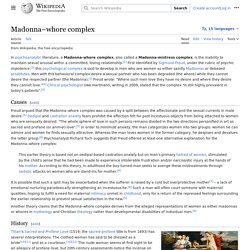
Macdonald triad. The Macdonald triad (also known as the triad of sociopathy or the homicidal triad) is a set of three behavioral characteristics that has been suggested, if all three or any combination of two, are present together, to be predictive of or associated with, later violent tendencies, particularly with relation to serial offenses.
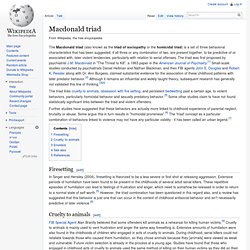
The triad was first proposed by psychiatrist J.M. Macdonald in "The Threat to Kill", a 1963 paper in the American Journal of Psychiatry.[1] Small-scale studies conducted by psychiatrists Daniel Hellman and Nathan Blackman, and then FBI agents John E. Douglas and Robert K. Ressler along with Dr. Ann Burgess, claimed substantial evidence for the association of these childhood patterns with later predator behavior.[2] Although it remains an influential and widely taught theory, subsequent research has generally not validated this line of thinking.[3][4] Firesetting[edit] Cruelty to animals[edit]
Milgram experiment. The experimenter (E) orders the teacher (T), the subject of the experiment, to give what the latter believes are painful electric shocks to a learner (L), who is actually an actor and confederate.

The subject believes that for each wrong answer, the learner was receiving actual electric shocks, though in reality there were no such punishments. Being separated from the subject, the confederate set up a tape recorder integrated with the electro-shock generator, which played pre-recorded sounds for each shock level.[1] The experiments began in July 1961, three months after the start of the trial of German Nazi war criminal Adolf Eichmann in Jerusalem. Milgram devised his psychological study to answer the popular question at that particular time: "Could it be that Eichmann and his million accomplices in the Holocaust were just following orders? Could we call them all accomplices? " The Missing Shade of Blue. The Missing Shade of Blue is an example introduced by the Scottish philosopher David Hume to show that it is at least conceivable that the mind can generate an idea without first being exposed to the relevant sensory experience.
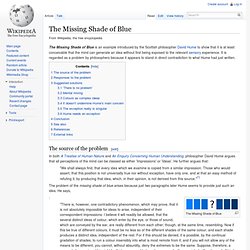
It is regarded as a problem by philosophers because it appears to stand in direct contradiction to what Hume had just written. The source of the problem[edit] In both A Treatise of Human Nature and An Enquiry Concerning Human Understanding, philosopher David Hume argues that all perceptions of the mind can be classed as either 'Impressions' or 'Ideas'. He further argues that: "We shall always find, that every idea which we examine is copied from a similar impression. Self-awareness. Self-awareness is the capacity for introspection and the ability to recognize oneself as an individual separate from the environment and other individuals.[1] It is not to be confused with consciousness.
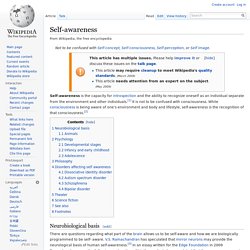
While consciousness is being aware of one’s environment and body and lifestyle, self-awareness is the recognition of that consciousness.[2] Neurobiological basis[edit] There are questions regarding what part of the brain allows us to be self-aware and how we are biologically programmed to be self- aware. V.S. Ramachandran has speculated that mirror neurons may provide the neurological basis of human self-awareness.[3] In an essay written for the Edge Foundation in 2009 Ramachandran gave the following explanation of his theory: "... Animals[edit] Studies have been done mainly on primates to test if self-awareness is present. Sense of agency. The "sense of agency" (SA) refers to the subjective awareness that one is initiating, executing, and controlling one's own volitional actions in the world.[1] It is the pre-reflective awareness or implicit sense that it is I who is executing bodily movement(s) or thinking thoughts.
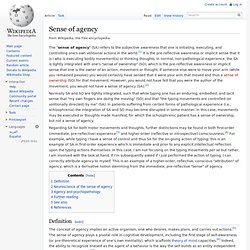
In normal, non-pathological experience, the SA is tightly integrated with one's "sense of ownership" (SO), which is the pre-reflective awareness or implicit sense that one is the owner of an action, movement or thought. If someone else were to move your arm (while you remained passive) you would certainly have sensed that it were your arm that moved and thus a sense of ownership (SO) for that movement. Pascal's Wager. Blaise Pascal Pascal's Wager is an argument in apologetic philosophy which was devised by the seventeenth-century French philosopher, mathematician, and physicist Blaise Pascal (1623–1662).

It posits that humans all bet with their lives either that God exists or does not exist. Given the possibility that God actually does exist and assuming the infinite gain or loss associated with belief in God or with unbelief, a rational person should live as though God exists and seek to believe in God. If God does not actually exist, such a person will have only a finite loss (some pleasures, luxury, etc.).[1] Pascal formulated the wager within a Christian framework. The Void (philosophy) Peter Matthiessen in The Snow Leopard (1978) described an experience of sitting on rocks in the Himalayas as leading to an awareness of a Void at the centre, or the source, of phenomenal existence: "These hard rocks instruct my bones in what my brain could never grasp in the Heart Sutra, that 'form is emptiness and emptiness is form' – the Void, the emptiness of blue-black space, contained in everything.
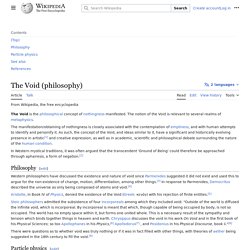
" Stanislav Grof's distinction between holotropic and hylotropic experience is important here, with the former encapsulating experiences which connect to the Void. Viktor Frankl Man's Search for Meaning (1946) Moving sofa problem. Stanford prison experiment. The Stanford prison experiment (SPE) was a study of the psychological effects of becoming a prisoner or prison guard. The experiment was conducted at Stanford University from August 14–20, 1971, by a team of researchers led by psychology professor Philip Zimbardo.[1] It was funded by the US Office of Naval Research[2] and was of interest to both the US Navy and Marine Corps as an investigation into the causes of conflict between military guards and prisoners.
Goals and methods[edit] Zimbardo and his team aimed to test the hypothesis that the inherent personality traits of prisoners and guards are the chief cause of abusive behavior in prison. Participants were recruited and told they would participate in a two-week prison simulation. Operant conditioning. Diagram of operant conditioning Operant conditioning separates itself from classical conditioning because it is highly complex, integrating positive and negative conditioning into its practices; whereas, classical conditioning focuses only on either positive or negative conditioning but not both together. Another dubbing of operant conditioning is instrumental learning. Instrumental conditioning was first discovered and published by Jerzy Konorski and was also referred to as Type II reflexes. Mechanisms of instrumental conditioning suggest that the behavior may change in form, frequency, or strength.
The expressions “operant behavior” and “respondent behavior" were popularized by B.F.